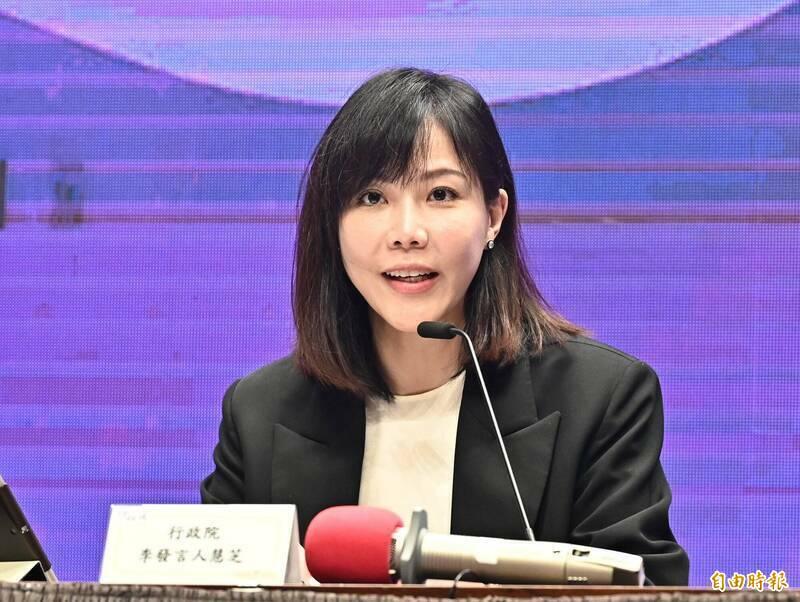The Executive Yuan today decried US President Donald Trump's 32-percent tariff on Taiwanese goods announced yesterday and said it would lodge a representation with Washington.
In a news release, the Cabinet described the pledged US tariffs, expected to take effect next Wednesday, as "deeply unreasonable" and "highly regrettable."
Cabinet spokesperson Michelle Lee (李慧芝) said the government would "lodge a solemn representation" with the United States Trade Representative and continue negotiating with the US to "ensure the interests of our nation and industries."

Photo: Taipei Times
At a news conference in Washington, Trump announced a 10-percent baseline tariff on most goods imported to the US, set to take effect on Saturday.
However, Taiwan and dozens of other countries, including some of the US' main trading partners, face much higher duties, in what Trump described as an effort to address "unbalanced" trading relationships, reduce trade deficits, and boost US manufacturing capacity.
In particular, the Trump administration will impose a 32-percent "reciprocal tariff" on Taiwanese goods entering the US, starting next Wednesday.
The "reciprocal tariffs" target countries that have enacted tariffs, manipulated currencies, subsidized exports, and implemented other trade barriers against the US, Trump said.
Nevertheless, certain goods, such as copper, pharmaceuticals, semiconductors, lumber, energy and "certain critical minerals" will be exempt from such levies, according to the White House.
In the news release, Lee said the planned 32-percent tariff was "unfair to Taiwan" because it "does not accurately reflect the trade and economic situation" between the two sides.
Taiwan's exports to the US have increased significantly in recent years mainly because of the surge in demand from the US for semiconductors and artificial intelligence-related products, Lee said.
Lee said many Taiwanese information and communication companies had relocated their manufacturing from China to Taiwan due to US tariffs on goods from China in Trump's first term and the US technology control policy against China over national security concerns.
In that regard, she went on, Taiwan should not be subject to high tariffs in view of its "tremendous contributions to the US economy and national security."
According to Lee, Taiwan's government has been actively cracking down on transshipment by Taiwanese producers, a practice where goods are routed through a third country to alter their country of origin in order to benefit from lower duties imposed on that third country.
The spokesperson hence argued that Taiwan should not be treated in a similar way as Vietnam, which faces a 46-percent tariff, Cambodia (49 percent), and Thailand (36 percent), where the problems of transshipment are more pronounced.
Lee also criticized the "unclear" methodology, scientific basis and international trade theory behind the US' tariff measures.
According to data from Taiwan's executive body, the US ran a trade deficit with Taiwan at about US$73.9 billion last year, a year-on-year increase of 54.6 percent, making Taiwan the sixth-largest source of trade deficits for the US.
The data also showed that last year, the total bilateral trade reached US$158.6 billion, up 24.2 percent compared to the previous year.

Alain Robert, known as the "French Spider-Man," praised Alex Honnold as exceptionally well-prepared after the US climber completed a free solo ascent of Taipei 101 yesterday. Robert said Honnold's ascent of the 508m-tall skyscraper in just more than one-and-a-half hours without using safety ropes or equipment was a remarkable achievement. "This is my life," he said in an interview conducted in French, adding that he liked the feeling of being "on the edge of danger." The 63-year-old Frenchman climbed Taipei 101 using ropes in December 2004, taking about four hours to reach the top. On a one-to-10 scale of difficulty, Robert said Taipei 101

Taiwanese and US defense groups are collaborating to introduce deployable, semi-autonomous manufacturing systems for drones and components in a boost to the nation’s supply chain resilience. Taiwan’s G-Tech Optroelectronics Corp subsidiary GTOC and the US’ Aerkomm Inc on Friday announced an agreement with fellow US-based Firestorm Lab to adopt the latter’s xCell, a technology featuring 3D printers fitted in 6.1m container units. The systems enable aerial platforms and parts to be produced in high volumes from dispersed nodes capable of rapid redeployment, to minimize the risk of enemy strikes and to meet field requirements, they said. Firestorm chief technology officer Ian Muceus said

MORE FALL: An investigation into one of Xi’s key cronies, part of a broader ‘anti-corruption’ drive, indicates that he might have a deep distrust in the military, an expert said China’s latest military purge underscores systemic risks in its shift from collective leadership to sole rule under Chinese President Xi Jinping (習近平), and could disrupt its chain of command and military capabilities, a national security official said yesterday. If decisionmaking within the Chinese Communist Party has become “irrational” under one-man rule, the Taiwan Strait and the regional situation must be approached with extreme caution, given unforeseen risks, they added. The anonymous official made the remarks as China’s Central Military Commission Vice Chairman Zhang Youxia (張又俠) and Joint Staff Department Chief of Staff Liu Zhenli (劉振立) were reportedly being investigated for suspected “serious

Nipah virus infection is to be officially listed as a category 5 notifiable infectious disease in Taiwan in March, while clinical treatment guidelines are being formulated, the Centers for Disease Control (CDC) said yesterday. With Nipah infections being reported in other countries and considering its relatively high fatality rate, the centers on Jan. 16 announced that it would be listed as a notifiable infectious disease to bolster the nation’s systematic early warning system and increase public awareness, the CDC said. Bangladesh reported four fatal cases last year in separate districts, with three linked to raw date palm sap consumption, CDC Epidemic Intelligence